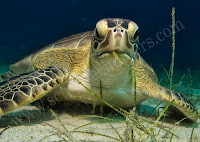Created in 1972, World Environment Day is a means to highlight the issues facing our environment and raise awareness amongst the general population. Like the Olympics, it is hosted by a different City in a different country and this year, it is Italy's turn to host the events.
Each year has a theme and this year that is Seven Billion Dreams. One Planet. Consume with Care!
With our Mediterranean neighbours hosting along with this year's theme, it brings forward thoughts of the plights of our oceans. There is so much reliance on the Oceans, to both make money and for survival, that it is really unsustainable to keep so much pressure on its resources from so many different places.
Besides sustaining life and supporting a whole underwater ecosystem, our oceans provide food (around 90 billion kgs of fish and shellfish are caught every year) and a means of transport for goods and people travelling. We mine our oceans for minerals such as; salt, copper, iron and nickel and, of course, we drill them for oil.
So, it is important that we look after them!
We need to manage our fishing and make it sustainable. Know which fish species are at risk and don't eat them because a lack of demand means the supply is no longer viable. Trawling and Dredging, gill nets and drift nets not only damage and destroy underwater habitats, they are responsible for over 27 billion tonnes of wasted fish and by-catch a year.
 Don't Litter!
Don't Litter!
Sounds easy enough but when you are out on your relaxing cruise boat or even lying on the beach, be sure to put your empty cans, food wrappers and cigarette ends in the bin or in a bag to be taken away and disposed of later. Many a time, we finish a dive with 4 or 5 beer cans in our pockets that have been blown off the day boats as they cruise by, so a little care can go a long way.
This one goes out in particular to the Scuba Divers out there. Get your buoyancy right and watch where you put your hands and your fins in the water. Although here in Cyprus, it is mostly rock and sand, you don't know what little creatures and critters are hiding nearby and you can do untold damage to the life underwater just by being careless.

In the last 50 years, the world population has more than doubled from 3.3 billion to over 7 billion in 2015 so the impact made per person adds up to devastating proportions. It isn't just the Oceans but our forests, woodlands and animal life too. We need to be a bit more discerning with our actions to try to limit the damage and make a conscious effort to give back where we can.
As Mahatma Gandhi said...
"The Earth Provides enough to satisfy every man's needs, but not every man's greed."
HAPPY WORLD ENVIRONMENT DAY EVERYBODY!
Each year has a theme and this year that is Seven Billion Dreams. One Planet. Consume with Care!
With our Mediterranean neighbours hosting along with this year's theme, it brings forward thoughts of the plights of our oceans. There is so much reliance on the Oceans, to both make money and for survival, that it is really unsustainable to keep so much pressure on its resources from so many different places.
Besides sustaining life and supporting a whole underwater ecosystem, our oceans provide food (around 90 billion kgs of fish and shellfish are caught every year) and a means of transport for goods and people travelling. We mine our oceans for minerals such as; salt, copper, iron and nickel and, of course, we drill them for oil.
So, it is important that we look after them!
We need to manage our fishing and make it sustainable. Know which fish species are at risk and don't eat them because a lack of demand means the supply is no longer viable. Trawling and Dredging, gill nets and drift nets not only damage and destroy underwater habitats, they are responsible for over 27 billion tonnes of wasted fish and by-catch a year.
 Don't Litter!
Don't Litter!Sounds easy enough but when you are out on your relaxing cruise boat or even lying on the beach, be sure to put your empty cans, food wrappers and cigarette ends in the bin or in a bag to be taken away and disposed of later. Many a time, we finish a dive with 4 or 5 beer cans in our pockets that have been blown off the day boats as they cruise by, so a little care can go a long way.
This one goes out in particular to the Scuba Divers out there. Get your buoyancy right and watch where you put your hands and your fins in the water. Although here in Cyprus, it is mostly rock and sand, you don't know what little creatures and critters are hiding nearby and you can do untold damage to the life underwater just by being careless.

In the last 50 years, the world population has more than doubled from 3.3 billion to over 7 billion in 2015 so the impact made per person adds up to devastating proportions. It isn't just the Oceans but our forests, woodlands and animal life too. We need to be a bit more discerning with our actions to try to limit the damage and make a conscious effort to give back where we can.
As Mahatma Gandhi said...
"The Earth Provides enough to satisfy every man's needs, but not every man's greed."
HAPPY WORLD ENVIRONMENT DAY EVERYBODY!

















































